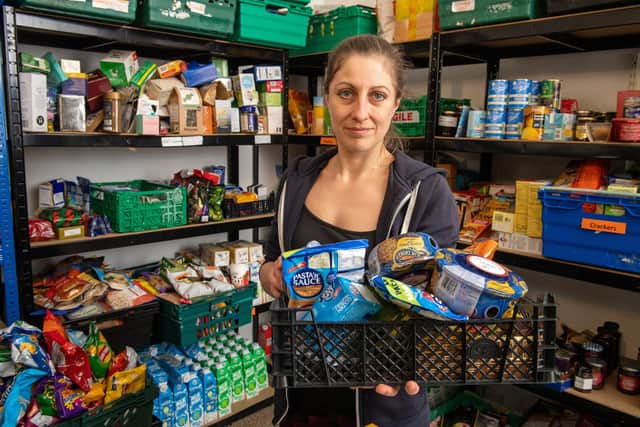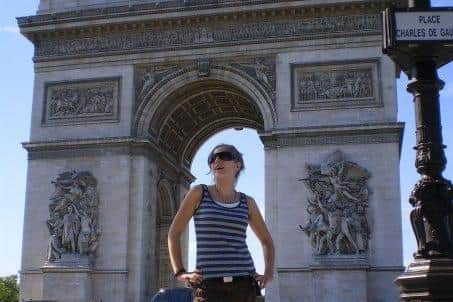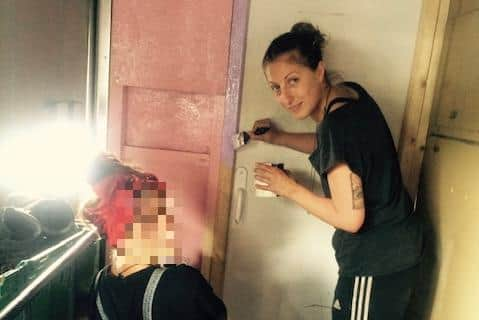Rainbow Junktion: Leeds food share manager shares what life in a refugee camp is really like
and live on Freeview channel 276
Now a manager with the Rainbow Junktion food waste cafe in Leeds, she recalls how her twenties were a time of finding out what she wanted to do and enjoying the nightlife of Paris. An unexpected invitation to the camps in Calais after she had raised funds to help refugees was a moment that changed the direction her life. She said: “It opened my eyes. I came back from that weekend just thinking I need to do something else.”
At the peak of the refugee crisis, Emily believed the British and French governments were not offering enough help and felt compelled to take action herself. She said: “I just couldn't carry on with my nice life. Within about two months, I had quit my job and moved permanently to Calais.”
Advertisement
Hide AdAdvertisement
Hide AdThe year she spent there could only be described as intense, she said. When she first started volunteering, there were about 5,000 people in the camps. The number had doubled by the time she left 12 months later.


“It was horrible,” she said. “It was watching people living in shacks and broken caravans and out in the open. They had no access to resources, to healthcare and were beaten by the police. It was absolutely horrific – but I wouldn’t say that there were no moments of joy there. There were also some really incredible, beautiful moments.”
The volunteers held beauty days where they would paint nails, offer massages and facials. Emily added: “I think that's so important. Your material needs are really important like food, shelter and security. But even if you don't have those things, you can still have a few minutes of a few moments of joy.
“We were just a group of women having a nice time together. It was just nice to see the stress relieved for a little bit for those women. It was just a real strange mix of awful and joyful at the same time.”
Advertisement
Hide AdAdvertisement
Hide AdEmily was involved in collecting items such as clothing to give to the women. Shoes were a high value item at the time, with a lot of people having walked for miles or had footwear confiscated by the police. She said: “We were just sort of a one-stop shop for any of the women and children in the camps to come, help them find a doctor, or lawyer, or help them find their family, or just talk to them and listen to people.”


She recalls working 12 to 14 hours most days. It was an “emotionally taxing” experience and her own manager advised her to after a year, shortly before the final eviction at the camp where she worked. “I was burnt out,” she said. “I could feel that I was getting to the end of it. In the state of my mental health, I couldn’t have watched the destruction of that camp so it was a good move for me personally to leave.”
A camper van became Emily’s temporary home while she figured out what to do next. She had already tried out a number of different careers before moving to Calais, including a shift manager at a pub and a film distribution role with Java Films.
The political documentaries the company produced had opened her eyes to the issues in the world, said Emily. She added: “I'm white and middle class. It just opened my eyes a lot to what's going on in the rest of the world, which then, I think, is what kind of pushed me to to going to Calais.”
Advertisement
Hide AdAdvertisement
Hide AdEmily had accepted her current job as manager at Rainbow Junktion before she had even moved to Leeds. Her experiences across different industries made her the ideal person for the role at the organisation, which aims to tackle food poverty, fight food waste and build communities.


"I feel like I’ve lived a few different lives,” she said. “Like there was university, then running the pub, and then there was film distribution. In terms of Calais, I have certainly never done an emergency food and clothing distribution before. I definitely learnt a lot of skills and and got a lot of ideas from what I was doing there, which we brought to Rainbow Junktion during Covid.”
Under her direction, the services that Rainbow Junktion offers have increased to support as many people as possible in Leeds – a city which Emily says has “saved” her. She added: “I have a Yorkshire rose tattooed on my foot, because I think Leeds saved my mental health. Leeds has absolutely got my heart.”
